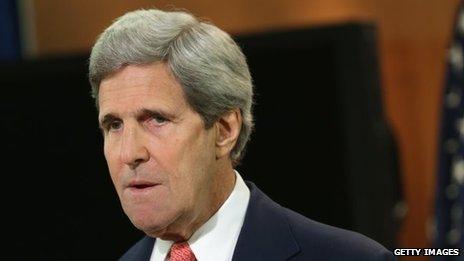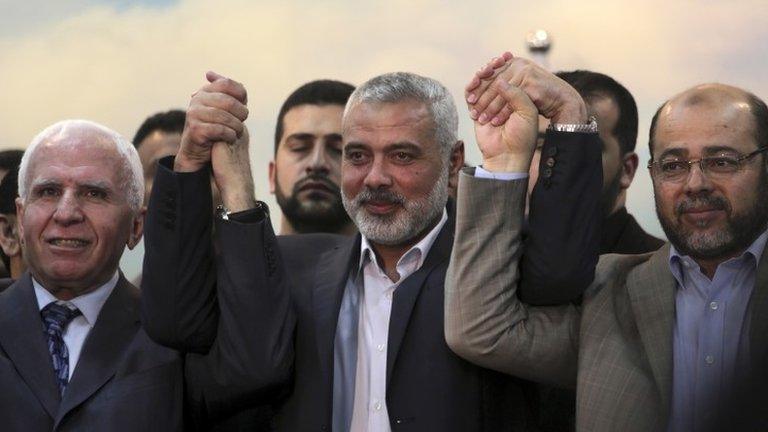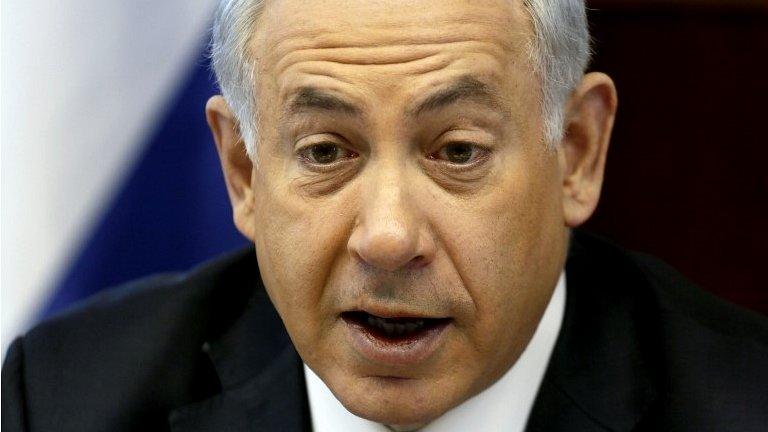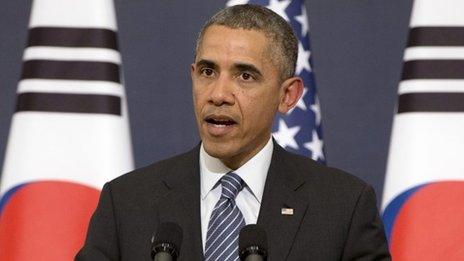Kerry warns of 'apartheid' without Middle East peace
- Published

John Kerry warned a "unitary" Israeli state would end up in apartheid
The US Secretary of State, John Kerry, has warned that Israel risks becoming "an apartheid state" if a two-state solution to the conflict with the Palestinians does not emerge soon.
His comments were captured in a recording of a closed-door meeting, the Daily Beast reported, external.
The current round of direct peace talks between the Israelis and Palestinians appear to be at an impasse.
But President Barack Obama has said the US will not abandon its peace efforts.
'Only real alternative'
Mr Obama has previously rejected the use of the term "apartheid" in discussion of the Middle East peace process, calling it unhelpful and inaccurate.
But in remarks before a group of high-ranking officials from the US, Europe and Japan known as the Trilateral Commission, Mr Kerry used the word.
"A two-state solution will be clearly underscored as the only real alternative," Mr Kerry said, according to the Daily Beast.
"Because a unitary state winds up either being an apartheid state with second-class citizens - or it ends up being a state that destroys the capacity of Israel to be a Jewish state."
Mr Kerry also reportedly suggested a peace deal was more likely to come with a change in Israeli and Palestinian leadership, and strongly criticised Jewish settlement construction on occupied territory.
The American-Israel Public Affairs Committee (Aipac) condemned his comments as "deeply troubling".
"Any suggestion that Israel is, or is at risk of becoming, an apartheid state is offensive and inappropriate," it said in a statement.
Suspended talks
In a statement to the BBC, the US state department noted that Israeli leaders had used the term "apartheid state" before, to warn of the consequences of the failure of the peace process.
"Secretary Kerry, like Justice Minister [Tzipi] Livni, and previous Israeli Prime Ministers [Ehud] Olmert and [Ehud] Barak, was reiterating why there's no such thing as a one-state solution if you believe, as he does, in the principle of a Jewish state," spokeswoman Jen Psaki said.
"He was talking about the kind of future Israel wants and the kind of future both Israelis and Palestinians would want to envision. The only way to have two nations and two peoples living side by side in peace and security is through a two-state solution. And without a two-state solution, the level of prosperity and security the Israeli and Palestinian people deserve isn't possible."
Last week, Israel suspended the current round of US-brokered peace talks, which resumed last July after a three-year hiatus, demanding the annulment of a reconciliation agreement between two main Palestinian factions.
Fatah, which is led by Palestinian Authority President Mahmoud Abbas, and Hamas, which governs Gaza, said they planned to form a unity government in the coming weeks.
Hamas rejects Israel's right to exist and is designated a terrorist group by the US, EU, Israel and other countries.
Mr Netanyahu told the BBC that Mr Abbas could "have peace with Israel or a pact with Hamas - he can't have both".
The US expressed "disappointment" over the unity deal, but pushed for the talks to continue.
Last week, Mr Obama said his administration would continue to offer "constructive approaches". But he added that "neither side had political will to make tough decisions" and that there might need to be a pause in the process.
- Published24 April 2014

- Published24 April 2014

- Published25 April 2014
